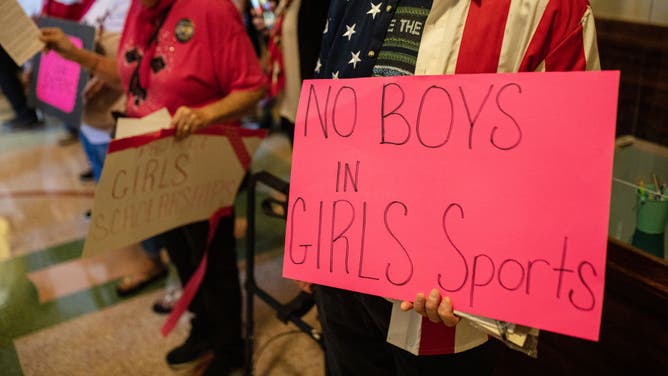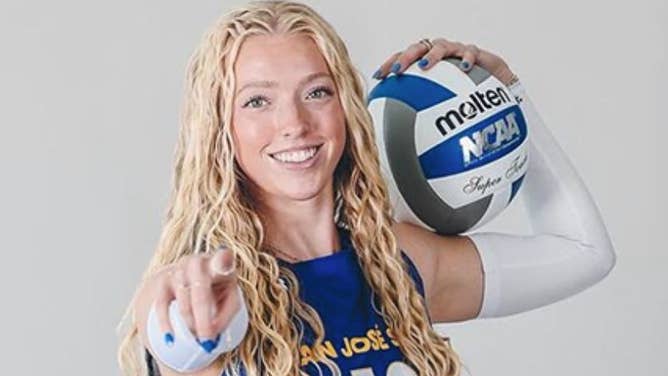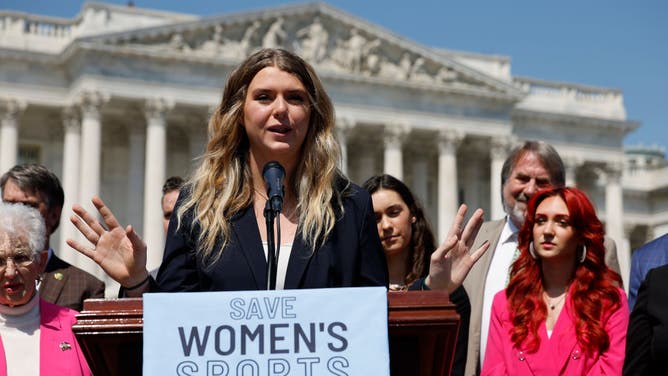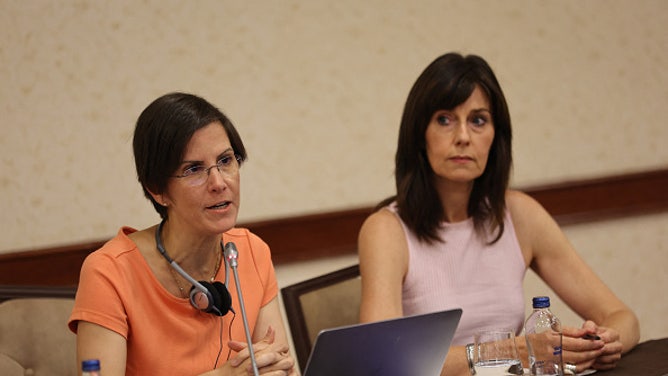We support our Publishers and Content Creators. You can view this story on their website by CLICKING HERE.
A group of female athletes and advocates championed the protection of women in sports during a panel event at the United Nations Headquarters on Wednesday.
The event came after Reem Alsalem, the U.N.’s special rapporteur on violence against women and girls, presented a report highlighting the risks of trans-identifying male participation in female sports. As previously reported by OutKick, Alsalem hoped that her recommendations would lead to the implementation of policies that would prohibit men from being included under the guise of gender identity.
READ: U.N. Human Rights Expert Will Highlight Dangers Of Inclusion Of Trans Athletes In Women’s Sports
Alsalem was joined on the panel by Alliance Defending Freedom CEO Kristen Waggoner, former Olympic swimmer Sharron Davies and former collegiate soccer player Lainey Armistead. Throughout the event, which was livestreamed on U.N. Web TV, panelists discussed the various hurdles women across the globe face when it comes to participation in sports.
“One glaring example of that is opening the female category of sport to males, further undermining their access to equal opportunities and the right to participate in safety, dignity and fairness,” Alsalem said in her opening statement.
“In fact, I don’t hesitate to say that the failure to protect the female category is one of the most egregious forms of violence that is currently being perpetrated against women and girls in sport, as the essence of being female is willfully pushed aside and ignored, resulting in distress, pain, humiliation, discrimination, frustration, and anger at the loss of dignity and safety.”

Demonstrators supporting restrictions on transgender student athletes are gathered at the Texas State Capitol in September 2021.
(Photo by Tamir Kalifa/Getty Images)
Armistead echoed that sentiment — highlighting the fact that women have been discouraged from speaking out against transgender participation in their sports.
“We’re told, ‘Pay no attention to the man behind the curtain,’ or, for female athletes, ‘Pay no mind to the man who finishes ahead of you on your women’s sports team or on the opposing team. Just suck it up and do your best,'” Armistead said.
“But so often, our very best will not be good enough — not because we didn’t train hard enough, not because we didn’t wake up at 6 a.m. for grueling practices — but because we are women, and we simply can’t compete against generally bigger, faster and stronger men.”
But it’s not just that men are biologically bigger, faster and stronger than women. Panelists pointed out that it’s also a privacy issue. Many women are uncomfortable undressing in front of trans-identifying males in their bathrooms and locker rooms.
U.N. Panelists: Allowing Men In Women’s Spaces Is A ‘Human Rights Violation’
Policies that allow men to infiltrate female sports, Armistead explained, threaten women’s safety and privacy in the places where they are most vulnerable.
“There is a real human cost to the claim that men can be women,” Armistead said. “We cannot stand by and watch as the clock on 50 years of progress for women is unwound and turned back. Women and girls should know that their privacy and dignity are protected when they enter their locker rooms, restrooms and hotel rooms.”
During the NCAA Swimming and Diving Championships in 2022, several female swimmers (including OutKick host Riley Gaines) expressed concern about sharing a locker room with male swimmer Lia Thomas, but those concerns fell on deaf ears. OutKick has also reported extensively on San Jose State volleyball player Brooke Slusser, who was forced to share a hotel room with her male teammate without her consent.

San Jose State’s Brooke Slusser is a current teammate of Blaire Fleming, a trans-identifying male whose sex was hidden by the school for nearly two years.
(SJSU Athletics)
These are just a couple of examples of a widespread problem caused by policies that were implemented to protect “inclusion” at the expense of fairness, privacy and safety.
“Because of these policies, what we’re seeing is women are being forced into situations with overnight accommodations, with locker rooms with showers, where they are being told to be silent,” Alsalem said. “And they are shamed for suggesting that they will not undress in front of a man. And that is unacceptable. It is a violation of human rights law to force anyone into that situation, and that’s what’s happening right now.”
Women Are Taking A Stand
Despite the stigma, more and more women are pushing back against policies that endanger their rights to privacy and fairness on the playing field. In March, a group of current and former female athletes — backed by the Independent Council on Women’s Sports (ICONS) — filed a class-action lawsuit against the NCAA alleging that the governing body has knowingly violated Title IX by allowing transgender athletes to compete against women and to use women’s locker rooms in collegiate sports.
Lawmakers in 25 states have also created legislation to protect women’s sports in the wake of the Biden Administration’s re-write of Title IX that would extend sex-based protections to include those who simply identify as women. And over the past month, five volleyball teams have refused to play against SJSU in protest of the team’s transgender player.
EXCLUSIVE: Nevada Players Vote To Forfeit Against SJSU, Transgender Player Despite School’s Statement

Lee University student athlete Macy Petty speaks during an event celebrating the passing of The Protection Of Women And Girls In Sports Act outside the U.S. Capitol in April 2023.
(Photo by Chip Somodevilla/Getty Images)
But it hasn’t been easy for them. Women who have spoken out, Alsalem explained, often do so “at great personal cost and in the face of even greater adversity and hostility.”
Armistead can certainly relate. A couple of years ago, the West Virginia State soccer player sued to protect West Virginia’s Save Women’s Sports Act. She faced plenty of backlash, but she won.
“In the United States, one of those trails blazed for women was Title IX, a federal law which gave us the ability to compete in athletics fairly,” Armistead said during the U.N. panel. “But now women are being asked again to simply smile and stay quiet about the boys who are participating in our sports and running away, sometimes literally, with the competition.
“Rather than accept this as a reality, I decided to take action.”
Armistead is just one of many courageous women who have stepped up to say enough is enough. But as Waggoner explained, they shouldn’t have to.
“It should have never come to this,” Waggoner said. “It’s stunning to me that women and girls can be sidelined in their own sports and that the first to stand up are high school and college athletes. High school and college girls should not be expected to have to stand up for their own rights. Our institutions, our government officials and our parents should be standing up for them.”
UN Panelists: It’s Time To Follow The Science
During the event, Waggoner cited ample scientific data that proves an inherent physical advantage that male bodies have over females when it comes to sports.
“The reality is that an average male athlete can often beat an elite female athlete on the field. This is why so many sports have traditionally been segregated or separated on the basis of sex,” Waggoner said.
“The creation of female athletic spaces has never been about division. It’s about recognizing objective biological differences and empowering women and girls in light of those differences to reward genuine merit.”
The panelists emphasized that everyone — regardless of gender identity — should have the right to participate in athletics. And they do. They just need to compete in the category that aligns with their biological sex.
It’s a simple solution, panelists said, that would preserve fairness for women while still fostering inclusion for all.
“My hope is just to go back to common sense,” Armistead concluded. “It’s crazy that this is even something that I’m having to advocate for. I never imagined as a young child who was kicking the soccer ball that this would be an issue. It never even crossed my mind.
“So my hope is that common sense will return and that women and girls will have a safe place to not only compete on the playing field and attain those scholarships and attain leadership positions, but also just a safe place to be vulnerable with other girls and women.”

Reem Alsalem, United Nations Special Rapporteur on violence against women, advocates for the protection of women in sports.
(Photo by ADEM ALTAN/AFP via Getty Images)
There’s still plenty of work to do. But, as Reem Alsalem pointed out, the fact that the issue is now being addressed on the international stage is a step in the right direction.

 Conservative
Conservative  Search
Search Trending
Trending Current News
Current News 





